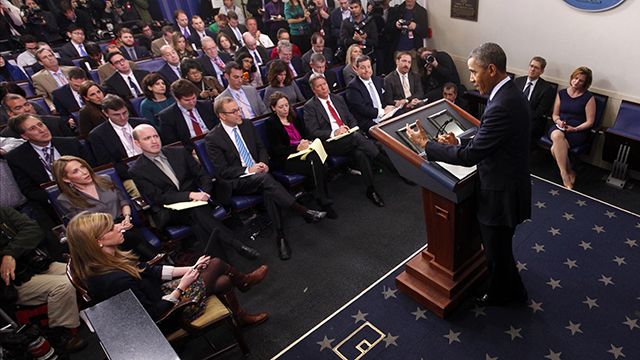We’re proud to collaborate with The Nation in sharing insightful journalism related to income inequality in America. The following is an excerpt from The Nation’s “This Week in Poverty” blog.

There are certain facts of life reflected by the FY 2014 Obama budget proposal: first, anything really worth having is going to be hard to get; and, the regrettable corollary — some things you don’t want are a lot closer to reality.
There are new and even historic anti-poverty proposals in this budget. But the better they are, the more they fall into the “hard to get” category. On the other hand, Social Security cuts in the form of smaller cost-of-living adjustments could far more easily become real.
Still, it is a president’s duty to incorporate proposals in his budget that would increase shared prosperity, even if some may take years to achieve. President Obama includes thoughtful plans to reduce poverty: targeting job development in the poorest communities; preserving tax credits and food assistance for low-income families; carrying forward health insurance expansions, and promoting the healthy development of children from infancy on.
What’s historic in the president’s budget plan? His commitment to improving education for children from birth to five. “Preschool for All” — a $75 billion, 10-year proposal — would ensure that every low- and moderate-income four-year-old has access to a pre-kindergarten education. The money would come from an increase in the tobacco tax. The budget also allocates $1.4 billion next year for Early Head Start and child care partnerships that would increase high-quality early learning programs for infants and toddlers through age three.
The president’s budget attempts a comprehensive approach — using resources from multiple government agencies — to attack both the causes and toxic by-products of poverty. It would create 20 Promise Zones, coordinating housing, education, anti-violence and other economic development initiatives. It would more than triple funds for The Choice Neighborhoods Initiative to improve distressed HUD-assisted housing in very poor communities. It increases Homelessness Assistance Grants by about $350 million, not counting the extra across-the-board cuts now being made. The current sequestration cuts that could end rental housing vouchers for 140,000 low-income families would be reversed.
The president’s $12.5 billion Pathways Back to Work proposal would provide summer and year-round jobs and training for low-income youth and subsidized jobs and training for the long-term unemployed. There are initiatives to improve high schools and to invest in community colleges. The budget would stop cuts in food stamps scheduled to start in November.
While the last deficit reduction deal made the Bush tax cuts permanent for all but the richest 1 percent, improvements in the low-income tax credits enacted in 2009 were only extended for five years. The Obama budget makes the current levels permanent for the Child Tax Credit, Earned Income Tax Credit and the American Opportunity Tax Credit — lifting more than 9 million low-wage workers and their children above the poverty line and creating greater opportunity for low- and middle-income students to attend college.
Then there’s the bad news.
The budget slashes the Community Services Block Grant to $350 million (down from $682 million this year). These funds support community action agencies nationwide, which administer Head Start, home energy assistance, emergency food and local economic development and other anti-poverty initiatives. These agencies leverage private dollars and coordinate services — exactly the kind of efficiencies the Administration is counting on. The budget also cuts the Low Income Home Energy Assistance Program (LIHEAP) by more than $500 million. And by shrinking the annual inflation adjustment (the “chained-CPI” proposal), the Administration reduces not only Social Security benefits but also over time the value of the Earned Income Tax Credit.
The president’s budget does include protections to reduce the impact of this lower adjustment for inflation. Social Security beneficiaries over age 76 and people receiving disability benefits for long periods will eventually receive an increase in their benefits to mitigate their loss. While the lowest-income people may in the end receive higher benefits than under current law, they will experience years of losses before their benefits catch up. (And some won’t live to see those gains.) The Administration’s proposal exempts low-income programs like food stamps/SNAP, Supplemental Security Income and Pell Grants from the “chained CPI” reductions, although there is concern that if cuts can be applied to a popular program like Social Security, these low-income programs will remain vulnerable.
While the job creation and economic development proposals are well designed, the scope is not adequate to meet the needs of the current weak economy. The president stated that his budget shows it is possible to reduce the deficit and invest in economic growth at the same time. But the Senate budget, with more revenue and more Pentagon savings, demonstrates this possibility more clearly.
What can make the anti-poverty and job creation provisions less of a long shot? Those who care about making investments in our people have to speak out loudly about the damage from the budget cuts now in effect, and vigorously support the expansions. A groundswell of public support is now pressing Congress to pass immigration reform and prevent gun violence. We need to see that same kind of tenacity, determination and outcry for shared prosperity, too.
 |
Deborah Weinstein is the executive director of the Coalition for Human Needs, a Washington, D.C.-based alliance of national organizations working together to promote public policies that address the needs of low-income people and other vulnerable populations. |

